
Japan's seafood takes a hit in Fukushima row
China has lost no time in slapping a full ban on Japanese seafood - which could cost Japan millions.
2023-08-24 18:55
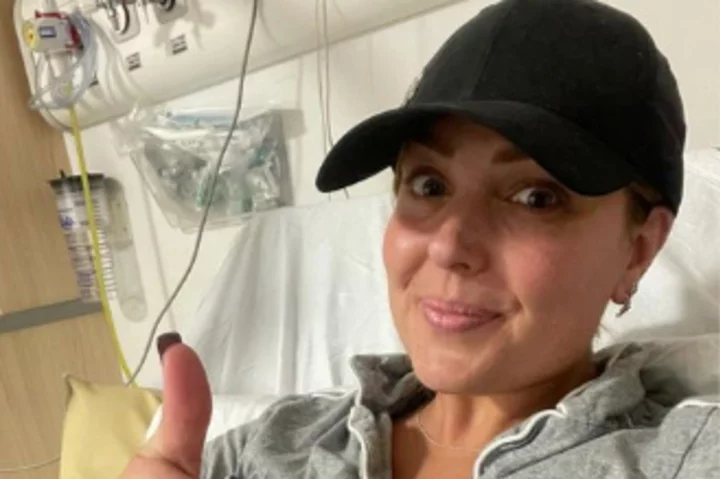
Strictly’s Amy Dowden finding it ‘so hard’ as she shares hair loss update during cancer treatment
Amy Dowden has shared an update on her hair loss after announcing she has breast cancer. The professional dancer, who is best known for appearing on BBC’s Strictly Come Dancing since 2017, revealed earlier this year that she had been diagnosed with stage three breast cancer. The dancer told fans that she underwent a single mastectomy after she was first diagnosed in May. Last month, however, she was told by doctors that she needed to undergo chemotherapy after further tumours were discovered following the surgery. Dowden, 33, has been keeping her fans updated as she navigates the treatment. In her latest update, shared on Wednesday (23 August), the dancer revealed she has been experiencing hair loss and was finding it “so hard”. Telling fans she had returned home after receiving treatment in the hospital, Dowden shared a picture as she held a clump of her hair, writing: “Welcome home,” with a series of broken heart emojis. She added: “So much everyday! So hard! One day at a time!” In a previous post, Dowden shared a video of her hair that had fallen out, writing: “The reality when I gentle comb,” with a broken heart emoji. Dowden told fans in a separate post that she had some blood clots but was “feeling good” following the treatment. “And I’m going home to my own bed,” she told fans. “Thanks again to the marvellous NHS! Got some blood clots but I’m feeling good other than a sore and swollen arm. Another hurdle along this journey. But again forever grateful to the nhs and my heroes around me.” Earlier this month, Dowden showed her followers the bespoke wig she had made to deal with her ongoing hair loss. Both Dowden and the owner of Be Unique Wigs by Charlotte shared a screenshot of their messages to Instagram, as Dowden thanked her for making the wig. Charlotte, the wigmaker, wrote: “I’ve been working on a wig for the beautiful @amy_dowden and just received this lovely message from her! “I love her,” wrote Dowden in the messages, asking if she could order another one. “Thank you so so so very much.” The wigmaker said in an Instagram post that it was an “honour” to make the wig for the Strictly professional. “I’m hoping it will give you some comfort in a difficult time, I’ve said many times on here... it’s not just hair!” she said. “Losing your hair can make such a difference to your confidence. It’s almost like losing part of your identity,” Charlotte added. After announcing her diagnosis earlier this year, Dowden told fans that she would not be able to dance in a competitive capacity on this year’s season of Strictly. “This year, it means I’m not going to be able to dance with a celebrity on Strictly, but I’m in such regular contact with the team – the BBC have just been utterly incredible,” she wrote in a post on social media last month. “The rest of the year looked very different to what was planned but hopefully I’ll enter 2024 cancer free and I’ll never take anything for granted and promise to live life to the full.” Dowden joined Strictly in 2017, and has competed in every series since, reaching the final in 2019 with kids’ TV presenter Karim Zeroual. Read More Former royal chef explains why Prince William and Kate’s children don’t eat with them Barbie drooling over Darcy? Why we still ardently love the BBC’s 1995 Pride & Prejudice Prince Harry to return to UK on eve of Queen’s death anniversary for charity event Amy Dowden shares pictures of new wig amid chemotherapy treatment for breast cancer How to help your teen with comparison culture on GCSE results day Women more severely affected by ME, study claims
2023-08-24 17:15

Naver Jumps Most in 9 Months After Korea ChatGPT Rival Debut
Naver Corp., South Korea’s online media and services leader, gained its most in three quarters after unveiling the
2023-08-24 16:24

How to help your teen with comparison culture on GCSE results day
Whether your child’s GCSE results are high, low, or somewhere in between, one thing is inevitable – they’ll compare them with their friends’ grades. This comparison culture, which is far more pervasive because of social media, can leave teens feeling inadequate because their results are worse than their mates, or make their friends feel useless if roles are reversed. But although there’s no getting away from teenagers comparing their results both on and offline, what can parents do to try and limit the damage this it can cause? Former teacher Dr Julia Clements, principal educational psychologist at the children’s mental health charity Place2Be, says the comparison of results will undoubtedly impact some teenagers’ wellbeing. “Your teenager is bound to compare their results with their peers at the same school, but also through social media,” she acknowledges. “Although this comparison is inevitable, it may be harmful for your child’s wellbeing – especially if they’ve not done as well as expected. “Indeed, the term ‘compare and despair’ can be especially pertinent on days like today.” Sharon Davies, CEO of Young Enterprise, a charity which helps young people navigate the changing world of work, adds: “The pressure to measure up to their friends’ achievements can be overwhelming, leading to feelings of inadequacy or disappointment.” So how can parents help their teens? 1. Ask how they feel If your child is down on themselves and rating themselves negatively in comparison to their friends, they may reject any positives and praise parents provide, Clements warns. “It may be more useful, in the first instance, to ask them how they’re feeling, and to acknowledge and validate difficult feelings,” she advises. Such feelings may include disappointment, sadness, anger, shame, or feeling as if they’ve let themselves – and you – down. “If your child is feeling like this, it’s important to give them the message that you love them unconditionally and you’re proud and pleased to be their parent because of who they are – not because of the grades they achieve,” she stresses. 2. If they’ve done better than their friends… If your child has achieved good results, which may be better than some of their friends, then they’ll want to celebrate. But while celebrating is of course a great idea, Clements suggests: “You may want to talk with them about how to be sensitive and compassionate towards their friends who haven’t done so well.” 3. Help them turn a negative into a positive Consultant clinical psychologist Dr Nihara Krause specialises in teenage mental health and is working with the Talking Futures campaign to help parents engage their children in meaningful conversations about their futures. She says if a young person doesn’t get the grades they were hoping for, they may be highly critical of their performance in comparison to their peers. But she suggests parents show them how to turn their negative thinking around. “Parents should encourage their children to focus on recognising the approach they took to exams this time round and take steps to reflect on what they could do to achieve a better result in the future. Focus on what helps a young person gain their own personal best, no matter how their results compare with others.” 4. Don’t ask about their friend’s results or post about them Krause says parents should try to celebrate their child’s achievements for what they are and avoid asking about their friends’ results. “To avoid comparison, parents should also avoid sharing their child’s results on social media,” she says. 5. Don’t be too hard on yourself Clements points out that comparison culture may not just affect teenagers – if their results aren’t as good as expected, mums and dads might start comparing their own parenting during the revision and exam period with other parents whose kids have got better results. “As a parent or carer, you may also be drawn into unhelpful comparisons with others,” says Clements, “and you may question the amount of support you were able to provide your child in the run up to their exams. However, today is not a day for self-criticism or judgements – some self-compassion is important at this time.” 6. Reach out for support This might be the first results day many parents have gone through with their child, and while comparisons with other teens may well have been unhelpful, Davies points out that schools will have career advisers and teachers available who can offer support and advice. There are also online forums and blogs where those in similar situations share their experiences. She says: “No-one is expecting you to have all the answers – that’s why there’s support available.” Read More Charity boss speaks out over ‘traumatic’ encounter with royal aide Ukraine war’s heaviest fight rages in east - follow live Women more severely affected by ME, study claims 4 hacks to get teens off the sofa and get active – as study warns of heart damage Taking adult education classes may lower risk of dementia, study suggests
2023-08-24 13:51
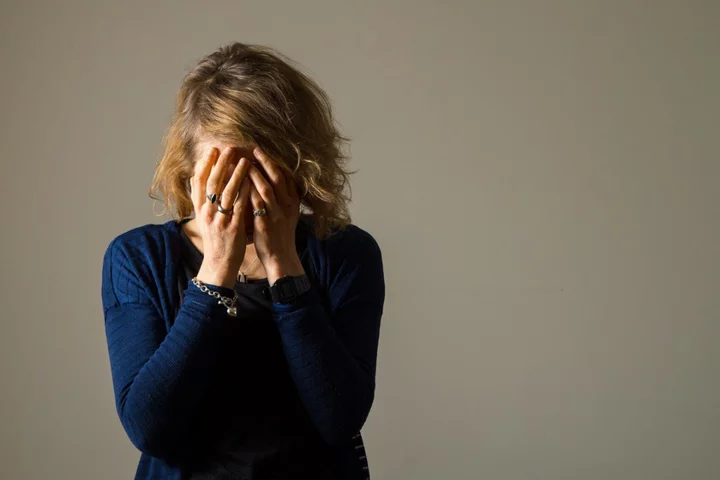
Women more severely affected by ME, study claims
Women with myalgic encephalomyelitis/chronic fatigue syndrome (ME/CFS) tend to have more symptoms and co-occurring conditions than men, according to the world’s largest study of the disease. The study, entitled DecodeME, reveals women who have the condition for more than 10 years are more likely to experience increasingly severe symptoms as they get older. ME/CFS is estimated to affect more than 250,000 people in the UK, of all ages and from all social and economic backgrounds. Its key feature, called post-exertional malaise, is a delayed dramatic worsening of symptoms following minor physical effort. Other symptoms include pain, brain fog and extreme energy limitation that does not improve with rest. Causes are unknown and there is currently no diagnostic test or cure. Experts from the University of Edinburgh analysed anonymous survey questionnaires from more than 17,000 people with ME/CFS. Two-thirds of women, and slightly more than half of men, reported at least one active co-occurring condition. Similarly, 39.2% of women and 28.6% of men reported at least one inactive co-occurring condition. We discovered that the disease is worse for women, in older people, and many years after their ME/CFS started Professor Chris Ponting of the University of Edinburgh A condition was considered active if the participant had experienced symptoms in the preceding six months. The most common active co-occurring condition was irritable bowel syndrome, with clinical depression, fibromyalgia, anaemia and hypothyroidism also featuring prominently. Women also reported, on average, more symptoms than men – 42 compared with 36. The most common of these symptoms were brain fog – a term commonly used to describe the cognitive impairment experienced by participants – unrefreshing sleep and muscle pain. These findings highlight the very serious impact ME/CFS has on women who are disproportionately affected Sonya Chowdhury, chief executive of Action for M.E Participants were also asked to define the severity of their illness from mild to very severe using definitions from the UK’s National Institute for Health and Care Excellence guidelines. Experts identified that being a woman and having ME/CFS for more than 10 years are risk factors for severe illness, with symptoms increasing in intensity as they age. Professor Chris Ponting, study lead from the MRC human genetics unit at the University of Edinburgh’s Institute of Genetics and Cancer, said: “ME/CFS is a devastating disease affecting a UK population the size of Derby. “We discovered that the disease is worse for women, in older people, and many years after their ME/CFS started. “Our hope is that DecodeME’s genetic results will shed light on why certain groups are more susceptible to ME/CFS than others.” Sonya Chowdhury, chief executive of Action for M.E. and chair of the management group of the study, said: “These findings highlight the very serious impact ME/CFS has on women who are disproportionately affected. “It’s important to also recognise the impact that it has on men who have ME/CFS and we thank the 20,000 men and women who have already signed up to take part in this very important study. “We still need more to join us, so if you are 16 or older, live in the UK and have a diagnosis of ME/CFS, please do take part now to help us decode ME at www.decodeme.org.uk/portal.” Read More Charity boss speaks out over ‘traumatic’ encounter with royal aide Ukraine war’s heaviest fight rages in east - follow live 4 hacks to get teens off the sofa and get active – as study warns of heart damage Taking adult education classes may lower risk of dementia, study suggests Indiyah Polack: I didn’t want to go on Love Island because of my acne
2023-08-24 13:29
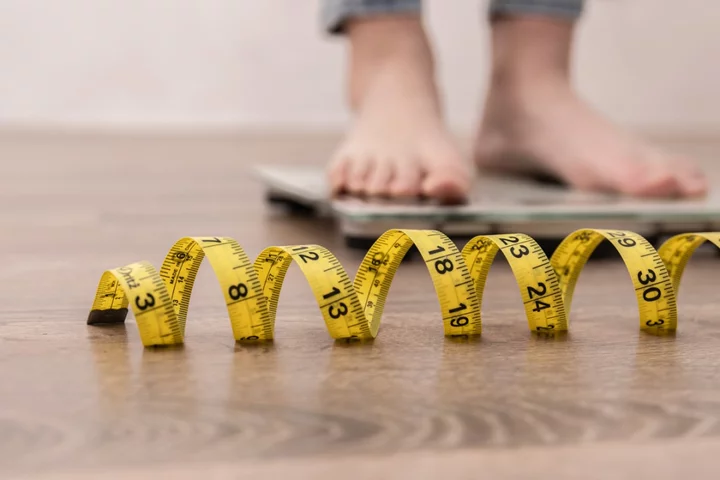
Weight loss surgery can reduce risk of cancer among women, study says
Weight loss surgery can help lower the risk of developing cancer, a study has claimed. The study, conducted by researchers at the University of Utah, also found that cancer mortality rates were significantly lower among female surgical patients compared to those who did not receive any bariatric surgery. Although population studies have previously established a positive association between body mass index and cancer rates, it has remained unclear whether the reduction in body weight leads to reduced cancer risk. Researchers say this is due to significant and sustained weight loss in large populations which may be difficult to achieve. However, because of the substantial and maintained weight loss following bariatric surgery, recent studies have reported reduced cancer rates and lower cancer mortality compared with those who haven’t had the proceedure, according to the study’s authors. “As scientists study human diseases, an element of discovery is to confirm like results from multiple studies,” said study author Ted Adams. “This research represents another important study that strongly supports the long-term benefits of weight loss surgery in the prevention of cancer.” Researchers compared cancer prevalence and death rates arranged according to obesity and non-obesity-related cancers, looking at sex, stage of the disease and procedure. The study looked at 22,000 bariatric surgery patients compared with non-surgical subjects with severe obesity between 1982 to 2019. Each patient was matched up based on age, sex, and body mass index. Scientists found that the bariatric surgery group had a 25 per cent lower risk of developing any cancers compared to the non-surgery group. Female patients had a 41 per cent lower risk for developing obesity-related cancers compared to those who did not have surgery done. Cancer risk for male bariatric surgery patients was not lower compared to non-surgery male subjects. Overall, a significant reduction in cancer risk was shown for cancers such as uterine, ovarian, colon, pre-menopausal breast and post-menopausal breast. The study also revealed death from cancer was lower by 47 per cent among female bariatric surgery patients in comparison to matched non-surgery female patients. “Important findings of this study are that bariatric surgery results in lower incidence rates of colon cancer (prior studies have not been consistent),” Dr Adam said. “Also, both pre and post-menopausal women experience reduced breast cancer incidence following bariatric surgery, which may suggest weight loss among women in either category with severe obesity may benefit from reduced breast cancer.” The study is available online in the journal Obesity. Read More Can a vegan diet help with hot flashes in menopausal women? Exercise apps could help boost healthcare workers mental health How to check if you have skin cancer: Symptoms and signs to look out for
2023-08-24 01:45

Kim Kardashian’s Skims bosses insist building a mega-money celeb brand isn’t “easy”
Despite the shapewear business being valued at £3 billion after only four years, the husband-and-wife team who run Kim Kardashian’s Skims line have insisted building a lucrative celebrity-based brand isn’t easy.
2023-08-23 20:55

4 hacks to get teens off the sofa and get active – as study warns of heart damage
The amount of screen time teenagers get is a worry to lots of parents. And, it turns out, the health impacts of being inside and staring at a screen for long periods of time as a young person can have serious impact on physical health further down the line. According to new research, parents should limit the amount of time children spend on social media and video games, after a study found inactive teenagers are more likely to have signs of heart damage as young adults. A child may appear ‘healthy’ but, even children who have a normal weight were still at risk, the study of 766 British youngsters found, after tracking them for 13 years. Academics involved in the research, which is to be published at the ESC Congress in Amsterdam, said that this heart damage could be setting the stage for heart attacks and strokes in later life. So, how can we get teens up and out? 1. Encourage them to destress Teens may take to their screens to distract themselves from day-to-day life, watch TikToks, or aimlessly scroll – which they may see this as a form of relaxation. It might be helpful to frame exercise in the same way for stressed teens. “Young people today are facing many stress factors in their daily lives and exercise can be an important mechanism to cope and overcome such difficulties,” says Dr Triveni Joshi, consultant child and adolescent psychiatrist for Cygnet Health Care. Reiterate the benefits of exercise for their mental wellbeing too. “When you exercise, your body produces dopamine and endorphins in your brain that help you to feel good. Exercise can have a direct impact on improving mental health by reducing anxiety, depression and low mood,” she says. “Plus, exercise can give you a real sense of accomplishment and pride at having achieved a goal, thereby improving self-esteem and confidence.” Celebrate the accomplishment of just getting out and being healthy for positive reinforcement. 2. Suggest things that interest them “There is always an activity which can suit somebody,” says Joshi.”There is a range of opportunities for physical activity such as gardening, walking groups, Zumba, dancing, pilates, or swimming.” Sports like weightlifting and running are big on social media and “can improve confidence levels and tackle low self-esteem.” While being on social media may stop them from getting out, pointing towards creators who promote a healthier lifestyle may help them in the long run. Perhaps they can pair their on-screen interests and favourite creators with physical experiences. “Exercise should always be fun so often it is about finding where their interests lie and incorporating that into a healthy regime,” Joshi explains.3. Talk to them about why they don’t want to exercise There may be a reason why your teen isn’t eager to get up and about you don’t know about, and having an open discussion may help them feel more comfortable, and build a closer bond with you. “With other pressures in their lives they may feel tired and lack the motivation to get active,” Joshi says. “A lot can depend on personality type too. Introverted children may feel shy, embarrassed, or too concerned about judgements to take part in physical activity. It might not pique their interest or they may feel it is something they aren’t skilful at and therefore don’t have the motivation for fear of not being good at something.” Getting to the bottom of why they won’t exercise may help them feel more empowered to do so, particularly if you can relate to one another and take on this challenge together.4. Set a good example So much of our relationship with exercise is rooted in our childhood, so try to “encourage children to be active by setting the right example and being active yourself”, says Joshi. If you complain about exercise and are on your screen all the time, it sends the message that it’s normal. In trying to set a good example, you may find something you love to do together, like a specific yoga class, workout or weekly ParkRun. Read More Charity boss speaks out over ‘traumatic’ encounter with royal aide Ukraine war’s heaviest fight rages in east - follow live What we know so far about Naomi Campbell’s Pretty Little Thing collection Taking adult education classes may lower risk of dementia, study suggests Indiyah Polack: I didn’t want to go on Love Island because of my acne
2023-08-23 20:51

Taking adult education classes may lower risk of dementia, study suggests
Taking an adult education class could help lower your risk of developing dementia, researchers have found. Middle-aged and senior citizens in adult education have a 19% reduced chance of developing the condition within five years, a new study suggests. The findings also suggest that people who took the classes kept up their fluid intelligence – the ability to reason quickly and to think abstractly – and non-verbal reasoning performance better than peers who did not. First author Dr Hikaru Takeuchi, of Tohoku University in Sendai, Japan, said: “Here we show that people who take adult education classes have a lower risk of developing dementia five years later. “Adult education is likewise associated with better preservation of non-verbal reasoning with increasing age.” Here we show that people who take adult education classes have a lower risk of developing dementia five years later Dr Hikaru Takeuchi, Tohoku University Dr Takeuchi and his co-author Dr Ryuta Kawashima, also a professor at the Institute of Development, Ageing and Cancer at the university, analysed data from 282,421 people in the UK Biobank, which holds genetic, health, and medical information from approximately half a million British volunteers, They had enrolled between 2006 and 2010, when they were between 40 and 69, and had been followed up for an average of seven years at the time of the new study. Based on their DNA, people were given an individual predictive risk score for dementia, and self-reported if they took any adult education classes, without specifying the frequency, subject, or academic level. The study looked at data from the enrolment visit and third assessment visit, between 2014 and 2018. Those enrolled in the study were given psychological and cognitive tests, for example for fluid intelligence, visuospatial memory and reaction time. According to the study published in Frontiers in Aging Neuroscience, 1.1% of people in the sample developed dementia over the course of the study. It also found that people who were taking part in adult education, at enrolment had 19% lower risk of developing dementia than participants who did not. The results were similar when people with a history of diabetes, high cholesterol, cardiovascular diseases, cancer or mental illness were excluded. The researchers suggest this means the observed lower risk was not exclusively due to people with developing dementia being prevented from following adult education by symptoms of these known conditions. Dr Kawashima said: “One possibility is that engaging in intellectual activities has positive results on the nervous system, which in turn may prevent dementia. “But ours is an observational longitudinal study, so if a direct causal relationship exists between adult education and a lower risk of dementia, it could be in either direction.” Read More Charity boss speaks out over ‘traumatic’ encounter with royal aide Ukraine war’s heaviest fight rages in east - follow live Indiyah Polack: I didn’t want to go on Love Island because of my acne Everything you need to know about the UK’s first womb transplant Why are wellbeing experts concerned about the ‘lazy girl job’ trend?
2023-08-23 17:57
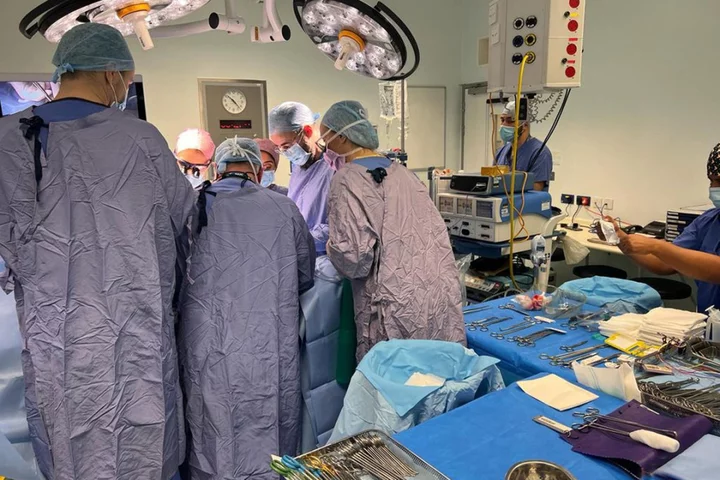
Everything you need to know about the UK’s first womb transplant
The UK’s first womb transplant means that, in future, dozens of women born without a functioning organ can carry babies of their own. – What has happened? Surgeons have performed the UK’s first womb transplant on a 34-year-old woman whose older sister donated the organ to her. In a complex procedure, the medical team removed the womb from the 40-year-old woman and implanted it directly into her sister. Both women have made a good recovery. – Have any babies been born? Not yet. Experts want to be sure the transplant is stable and the womb is functioning fully before the younger woman undergoes IVF. She has stored eight embryos and will have fertility treatment later this year in central London. The woman hopes to have more than one baby. Once she has completed her family, the womb will be removed to prevent her needing immunosuppressant drugs for the rest of her life. – Has the NHS paid for the operation? No. Each womb transplant costs around £25,000 and is fully funded by the charity Womb Transplant UK. This includes payment to the NHS for theatre time and the patient’s stay on a ward. The operations are only carried out at times when the NHS is not using the operating theatre, so they do not impact on usual NHS waiting lists. Surgeons and medical staff involved in the transplant have not been paid for the operation and have given their time freely. – Have other womb transplants been carried out around the world? More than 90 womb transplants have been carried out internationally, with most operations involving a living donor. The first successful womb transplant took place in Sweden in 2014, with the baby – Vincent – born to a 36-year-old woman who described him as “perfect”. In 2000, a transplant was performed on a 26-year-old woman in Saudi Arabia but the donor womb survived for only 99 days due to problems with its blood supply. To date, womb transplants have been carried out in more than 10 countries, including Saudi Arabia, Turkey, Sweden, the US, China, Czech Republic, Brazil, Germany, Serbia and India. – How successful is the operation? Data from the US shows that more than half of women who received a womb through a transplant in the US went on to have successful pregnancies. Between 2016 and 2021, 33 women received womb transplants in the US and, as of last summer, 19 of them (58%) had delivered a total of 21 babies. In 74% of those receiving a womb, the organ was still functioning one year after transplant and 83% of this group had live-born children. – Will there be more transplants in the UK? Yes. The second British womb transplant is scheduled to take place this autumn and experts believe a maximum of 20 to 30 per year could be carried out in the UK in the future. Transplants could help women born without a functioning womb and those who lose their organ to cancer or other conditions. Estimates suggest there are 15,000 women in the UK of childbearing age who do not have a functioning womb. – Will there be a shortage of donor wombs? Womb Transplant UK is running two programmes, one involving living donors and another with organs from people who have died. The living donor programme in the UK has so far focused on women with relatives who are willing to give their wombs. However, the team believes that in the future, the living donor programme will expand to include friends or altruistic living donors. This is currently more common in the US. The use of deceased donors is assessed by the team on a case-by-case basis. Read More Charity boss speaks out over ‘traumatic’ encounter with royal aide Ukraine war’s heaviest fight rages in east - follow live Why are wellbeing experts concerned about the ‘lazy girl job’ trend? How to check for cancer, as Morrisons puts NHS cancer advice in underwear labels Prostate screening ‘could save lives’ – the symptoms and risk factors you need to know
2023-08-23 15:45

Employee arrested after 1-year-old child dies in daycare van in Nebraska
A childcare employee has been arrested after a 1-year-old child died Monday after being left in a daycare van, police in Omaha, Nebraska, said.
2023-08-23 08:15
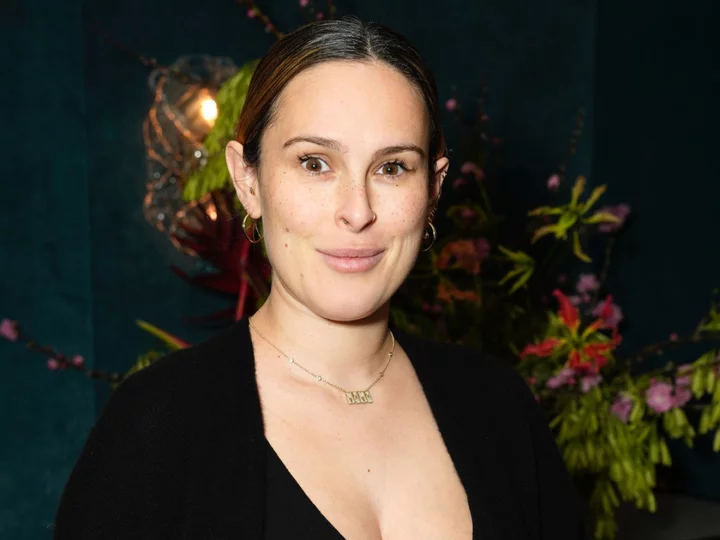
Rumer Willis reveals her daughter’s name was inspired by typo in a text
Rumer Willis has revealed that the name for her daughter, who she welcomed in April, was actually inspired by a text typo. The actress, 35, spoke candidly about her daughter, who she shares with boyfriend Derek Richard Thomas, during a recent interview with People. Willis went on to explain that while her daughter goes by Louetta, that wasn’t the name that she and Thomas had initially planned. “We were thinking about the name Loretta, and it was a typo,” she said. “Her dad and I were texting, and he left the ‘R’ out of Loretta, and it was just Louetta.” Willis - the daughter of Bruce Willis and Demi Moore - added that, after her partner made the typo in his text, she came to realise that she liked the name “Louetta” better than “Loretta”. “I was like: ‘Oh, I love that!’ I feel like it was one of those kind of divine intervention universe moments, and we figured it out actually quite early in my pregnancy,” she explained. However, according to The House Bunny star, she initially had a few concerns about if the name would be the best fit for her daughter. “What was scary was, I love this name, but oh man, is it going to be her name? Is it the right name?” she continued. What if she comes out and doesn’t look like this?” Despite her mixed feelings about the name during her pregnancy, Willis said she realised that she wanted to call her baby “Lou” once she was born. “I fell in love with the name so much, so early on, that I was then worried that it wouldn’t work,” she said. “But then she came out, and I mean, to me, at least right now, I was going to name her Lou, whether she was a boy or a girl.” She also added that both she and Thomas wanted to pick a name that had some “versatility” to it, before describing some of the different nicknames that her daughter could choose to go by. “If she doesn’t feel like a Louetta, she can go by Lou, she can go by Etta,” she said. “She can go change it up throughout her life. Whatever she wants.” Earlier this year, Willis took to Instagram to announce the birth of her first child. “Louetta Isley Thomas Willis. You are pure magic,” she wrote in the caption, alongside a snap of her then-newborn. “Born at home on Tuesday April 18th. You are more than we ever dreamed of.” Along with opening up about her baby’s name, Willis has also taken to social media to speak candidly about her experiences as a mother. Earlier this week, she hit back at criticism on Instagram after she shared a photo of herself breastfeeding her daughter. When Instagram users questioned her for sharing the selfie, with claims that she posted it “for attention,” the actress expressed how she viewed the ability to feed her daughter as a “privilege,” and accused critics of holding “a limited view of” breastfeeding. She continued defending her decision to post the photo, explaining how she wanted it to lessen the “shame” that women face. “I think it’s incredibly important to share because there is an incredible amount of shame that comes with being born into a female body,” Willis wrote. “And I want to lead by example in teaching my daughter that she doesn’t have to be ashamed of her body ever and that she can decide how she wants to share it.” Read More Rumer Willis shuts down criticism over breastfeeding photo with her child: ‘I am the happiest I have been’ Rumer Willis says she is ‘grateful’ to her body following birth of daughter Bruce Willis’ wife Emma Heming Willis says she is ‘not good’ amid his ongoing struggle with dementia Rumer Willis addresses criticism over breastfeeding photo with her child Rumer Willis says she is ‘grateful’ to her body following birth of daughter Serena Williams welcomes her second child with husband Alexis Ohanian
2023-08-23 05:25
